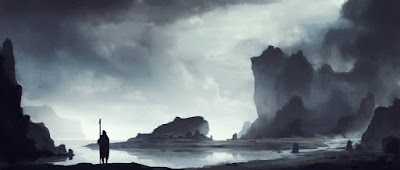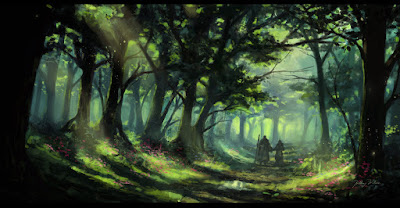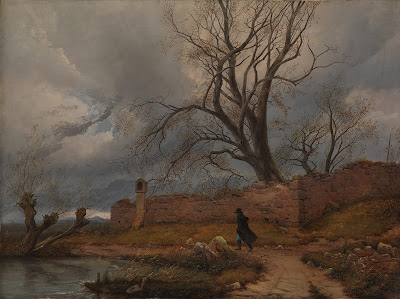 |
| It's just a really classy "This Way" sign |
I've been following The Angry GM for a while, and you can definitely see he has a prominent spot on my "Further Inspiration" section. But I want to take the time to call out his article on overland travel because it is just amazing.
Of course, in classic Angry GM style, the article is long and rambling, with a lot of game theory and example given between the actual meat of the system. So I wrote up the system in a slightly more readable and usable format. I'm planning to run either Out of the Abyss or Storm King's Thunder soon, and the massive distances traveled in those campaigns could really use the help.
Again, this is A REWRITE OF ANGRY'S SYSTEM. I just love it enough to make a version that I can easily reference.
Travel Rules
 |
| Yes it does |
- Prepare encumbrance rules if you are using them
- Set marching order for daytime encounters
Journey Preparation
Wherever the players want to go, give them options on routes to take.
- Routes along established roads should be safe, but also the longest
- More direct routes take less time, but should cut through creature territory and be more dangerous
 |
| Get off the road! |
Next, set 4 numbers for each route, or each part of the route if it passes through multiple regions.
Danger: 1-5
1: Safe, civilized, or barren areas
2: Dangerous Frontier areas (most off-road territory)
3: Enemy territory (use sparingly)
4: Enemy territory that is actively patrolled and extremely hostile
5: Hell, The Land of Monsters, etc
 |
| Probably a 5 |
0: Barren areas where civilization has never dwelt. These should be very rare.
1: Civilized areas, normal frontiers
2: Forests, hills, and densely packed terrain
3: Within ruins, or passing through a city
4: Anywhere with "Ancient" in the title
Navigation: 5-25
5: Coasts, or when following a river or road
10: Grasslands, within cities, and in the sky
15: Forests, Swamps
20: Hills, Mountains, and Underwater
25: Arctic tundras, deserts, underdark, sailing on the open sea
Resources: 5-25
5: Coastal or urban areas
10: Forests or hilly regions
15: Grasslands, swamps, open sea, and underwater
20: Arctic tundras, mountains, or the underdark
25: Deserts, and most planar locations
 |
| "What's on the menu?" "Rocks..." |
Creating encounters (Danger):
This should be fairly straightforward, just like creating a random encounter table as normal. I like to use the d8+d12 method to set the rarity of encounters, so I can include some unicorns, dragons, powerful wizards, etc. Your encounter table should also include some hazards and NPCs to spice things up.
Do note: you'll definitely want to make your encounters slightly more difficult, since the players will probably be resting in between fights.
Finding Cool Things (Discoveries):
These can be specific to each route, or generic. This is something that the party sees at a distance and must decide if they want to spend time pursuing. A decrepit tower, an old statue, a small cave, or even a strange NPC. It's best to have at least 2 discoveries available for every 3 days of travel.
I would think of discoveries like a one-room dungeon. Create a challenge, and if the players succeed give them a reward. However, there is a cost for the excursion, as explained below.
 |
| An abandoned tower? Don't mind if I do! |
Getting Lost (Navigation):
Each day, whoever has the best perception check, or someone with a good navigator ability, makes a navigation check. The DM should roll this in secret, and the navigator won't realize they failed a roll until they pass another navigation roll. If you want, you can also have the characters move in a different direction as long as they are lost.
 |
| "...wait a minute..." |
Of course, the players might be able to realize they are lost before the navigator passes a roll.
- If there is a major landmark, like a river, that the players are aware of, they could run into it and realize they are going the wrong direction
- If their "Travel Days" exceeds the planned "Days" of the route, they will certainly figure out they are lost
- They can pick a direction and travel that way until they hit a landmark (river, edge of forest, etc)
- They can find high ground and try to locate a landmark they can follow
- They can backtrack until they hit a landmark they know is right
Each day, every player should make a survival check vs the region's resources DC. If they fail, the player marks off one use of their rations. If the players have no food, they can survive (3+ their Con mod) travel days without food, or twice that if they decide to spread their food thin. After that time runs out, they start gaining 1 level of exhaustion per day (PHB pg. 185).
If at least one player succeeds on their foraging roll, all players can refill their water skins. This can be changed in certain areas, such as deserts, swamps, or open seas. In those situations, you might require half the party to succeed on their check, or even the entire party. If a player has no water, they gain 1 level of exhaustion. If they were already exhausted, they gain 2 levels instead. If a player spreads their water thinly, they can survive on half water. However, they will have to make a Constitution save of 15 each day or they will take exhaustion as if they had no water (PHB pg. 185).
 |
| This guy's been around the block a few times |
So, now that we've covered the creation of the routes and how each score will be used, we can actually get to:
The Travel Day
Pick a travel pace for the day.- Fast: They gain 1 1/3 days on the route
- Normal: They gain 1 day on the route
- Slow: They gain 2/3 days on the route
Check for Encounters: Roll 6d6. any results that are less than or equal to the Danger score result in a random encounter.
- Each die represents a different time of day, so use different colored dice or roll 1d6 6 separate times.
- Day encounters: Morning, Afternoon, Evening, Dusk (short rest between each)
- Night encounters: Midnight, Predawn (short rest between each, long rest overall unless both result in encounters)
- The players see this place off the beaten path at a random time during the day
- If the players explore it, subtract 1/3 day from the player's progress.
- Roll enemy stealth vs player perception, or player perception vs hazard detection DC
- Fast pace: Enemies have advantage, players have disadvantage
- Normal pace: roll normally
- Slow pace: Enemies have disadvantage, players have advantage. Allows players to stealth while enemies must use perception.
Make Camp
 |
| Good enough |
Roll for Navigation: DM rolls secretly, using the navigator's perception vs. the Navigation DC
- On a failure, no days are gained on the route, and the party is "lost" until they pass a check or hit a landmark
- Fast pace: players do not get a roll and must use up their rations. If you are nice you can let them refill their water skins at camp
- Normal pace: players roll their foraging check with disadvantage
- Slow pace: roll normally
- Ask who is keeping watch at midnight and at predawn.
- Roll enemy stealth vs watcher's perception. Treat hazards as "No encounter"
Exceptions and Player Abilities
Flight:If flight is possible, that should be the shortest but most dangerous route. The skies are home to many creatures, but also difficult due to weather. Hazards should be abundant. I would assign the danger rating at 3, or 4 during a storm. Also, remember that most flying mounts require on-ground rests for meals. For resources and discovery, use the terrain type the players are flying over.
 |
| "Did you hear something?" |
If your group has a ranger, you will want to tell them that they are capable of getting lost in their favored territory, which will go against what is written in the class ability (PHB pg. 91). Instead, give them advantage on their navigation roll while in favored terrain.
Rangers in favored terrain will also have advantage on perception rolls for random encounters, and when they pass their foraging roll (which they won't get advantage on) they will gain twice as much food. This can cover someone else's failed roll or refill someone's rations.
Outlander feature: Wanderer
Wanderers will also get advantage on navigation rolls, as well as on their foraging rolls. Again, this goes against the description as written (PHB pg. 136) so you will want to warn your players.
 |
| Oh deer |
Since elves can trance, they are capable of covering both watches in the night, if they desire.
Spells
- Augury and similar divination spells can grant advantage on navigation rolls
- Commune with Nature can negate a foraging check, but counts as a discovery and subtracts 1/3 day of travel distance. It can also potentially warn of high-level random encounters or building-like discoveries
- Create Food and Water negates a foraging roll for 1 day for up to 15 characters
- Create or Destroy Water refills waterskins for up to 10 characters, 1 day's worth
- Druidcraft has no effect on rations, it doesn't actually create a plant
- Find the Path can negate a navigation roll for 1 day, but remember it's a concentration spell. If the spell ends during the day, roll navigation as normal but allow the players to gain 1/3 or 2/3 days on their route.
- Goodberry counts as 1 day of food (not water) for up to 10 characters
- Heroes' Feast has no effect on rations, since it is only one meal
- Leomund's Tiny Hut can possibly negate night encounters
- Locate Animals or Plants and Locate Creature can negate a foraging check, but counts as a discovery and subtracts 1/3 day of travel distance.
- Pass Without Trace: can travel at fast pace as if it was normal, and normal as if it was slow. This only affects encounter perception rolls.
- Plant Growth can create rations for 1 day for up to 10 characters
 |
| Back in the pack! |
Thanks for reading!

No comments:
Post a Comment